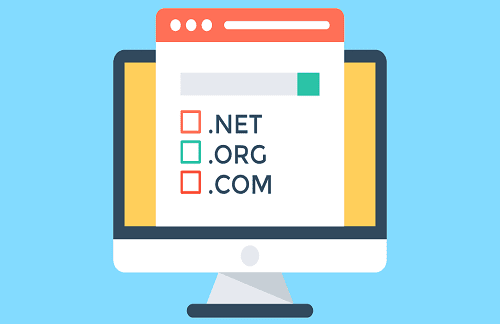When embarking on website creation, the selection of a domain name emerges as a critical choice. This decision holds immense significance as it shapes the site’s marketing and plays a pivotal role in shaping visitors’ perceptions of your brand.
What is Domain Name
A website domain name is a unique and human-readable address used to identify and access a specific website on the internet. It serves as the online equivalent of a physical address, allowing users to navigate to a particular website by typing the domain name into a web browser’s address bar. Domain names consist of two main parts: the actual name (such as “example”) and the domain extension (such as “.com” or “.org”). They are essential for establishing an online presence and making websites easily accessible to users.

Below are several guidelines to assist you in making the appropriate choice for your domain name.
-
Businesses do not possess domain names
Domain names cannot be “owned” by businesses; they are registered, granting registrants the right to use them. Therefore, it’s vital to maintain domain name registration to prevent potential loss.
Allowing a domain registration to lapse exposes it to the risk of being acquired by someone else when it becomes available after expiration.
To ensure the secure maintenance of a domain name registration, consider these four recommendations:
- Keep your credit card details updated with the domain registrar.
- Enabling automatic renewal is a proactive measure against domain loss, but its reliability can’t be guaranteed. Instances exist where auto-renewal failed to activate, leading to domain loss.
- Domain registrars usually send alerts before a domain’s expiration date. Regularly verify and update your domain registration email address, whether annually or quarterly.
- It’s a prudent practice to manually renew the domain registration prior to the auto-renewal date, erring on the side of caution.
-
Is it advisable for a domain name to align with your business name?
In most cases, aligning a domain name with the business name is advisable. However, the process of establishing a new online presence can also provide an opportunity to reevaluate the business name, opting for something more suited to the web or in tune with evolving trends.
An instance from my past involves a client who operated a digital camera website. The introduction of the iPhone prompted a swift shift as the demand for digital cameras declined. They opted to change their domain name to encompass a broader scope, enabling them to diversify into reviewing various products.
Changing trends can serve as a rationale for not strictly adhering to a domain name that mirrors the business name.
There are instances when it might be more effective to brand the online business with a more captivating or catchy name while retaining the business name in the background.
You may also like: Why Every Growing Startup Needs to Create a Robust Online Presence That With the Perfect Domain Name
Nonetheless, it’s crucial to always secure the domain name that corresponds to the physical business, even if the online platform employs a different name. This facilitates the option of redirecting the business name to the website or maintaining it in the background, depending on the demands of the business scenario.
-
Domain names that convey meaning
At times, it’s logical to register a domain name that conveys a specific meaning. An exemplary instance is seoconsultant.camrojud.com, a domain that effectively communicates its purpose through the inclusion of “Search Engine Optimization” denoting its content focus and “Consultation” suggesting a service-oriented nature.
When deliberating on a domain name with inherent meaning, it proves beneficial to consider the attributes you wish your site to be linked with. Returning to the On The Water example, this domain instantly transports anglers to their cherished waterside haven.
A constructive approach involves jotting down words that effortlessly evoke a distinct emotion or promise, which you want visitors to comprehend instinctively. For instance:
– Friendly.
– Economical.
– Swift.
– Lively.
– Specialists.
– Enthusiasts.
– Companions.
– Family-oriented.
– Reliable.
– Restorative.
Alternatively, you might aspire for visitors to associate your site with a particular setting, like:
– Office.
– Showroom.
– Storefront.
– Palace.
– Oasis.
– Digital.
– Zoo.
– Hangout.
– Zone.
– Cafe.
Survey synonyms for the quality you wish site visitors to link with your site, and engage in wordplay to pinpoint the ideal match.
-
Strive to keep the domain as concise as can be
An ideal domain name strikes a balance between brevity for effortless browser input and sufficient length for clear message conveyance to your audience.
For some, domain names comprising two to three words might prove optimal, while others might lean toward a concise one-word domain. The exact length doesn’t follow strict guidelines.
You may also like: What to Consider When Conducting an SEO Audit for a Domain
The paramount concern revolves around evading an excessively lengthy domain name that could pose memorability challenges. The guiding principle for determining domain name length hinges on contemplating how the domain name could impact prospective site visitors.
-
Defensive domain registration
Defensive domain registration involves preemptively securing domains that a potential competitor might seek to register in the future. It’s a wise practice to register both singular and plural forms of a domain name, along with extensions like .net, .org, .biz, .info, and .us.
If your website caters to an international or English-speaking audience, considering additional extensions like .ca and .co.uk could be advantageous.
While it’s a choice not to pursue these domains, should a competitor seize one of these variants, the site owner might face the cumbersome process of engaging legal counsel to issue a cease and desist notice to the competitor, possibly located in a developing nation, hoping they’ll relent due to apprehension.
This can prove to be quite a challenge. Personally, I prefer to avoid such complications.
Registering these supplementary domain versions serves not only a defensive purpose but also offers potential utility for other future applications. For instance, I once temporarily redirected a website to the .net domain while the .com version was undergoing maintenance.
-
Don’t use hyphens in domain names
Is it acceptable to incorporate hyphens within a domain name in the present day? Certainly not. Steer clear of hyphen usage when crafting a domain name. Placing excessive emphasis on keywords within domains for the sake of including hyphens is not warranted, as keyword presence isn’t as influential for ranking.
You may also like: How Much Does It Cost To Develop A Website For A Small Business?
Hyphens can impart an untrustworthy and spam-like appearance to the site. Furthermore, there exists no ranking advantage derived from incorporating keywords into the domain name.
-
Is it recommended to opt for a domain name containing keywords?
Domain names incorporating exact match keywords often exhibit a heightened conversion rate.
It’s conceivable that when a searcher assesses the search results pages (SERPs) and encounters a domain name featuring relevant keywords, a mental connection could trigger, leading them to think, “Ah, this website likely offers what I’m seeking!” This chain of thought could result in an increased likelihood of clicking through.
The inclusion of keywords within the domain name swiftly conveys to visitors that the site aligns with their search intent.
Consider an individual seeking a taco restaurant – they might lean towards “Vega’s Tacos” over “Nora’s Cantina.”
The keywords integrated into the domain name promptly suggest that the site not only offers the desired content but specializes in it. It’s worth noting that keywords within a domain name don’t carry a ranking advantage. The genuine advantage of keywords within a domain name lies in attracting visitors with a stronger intent to purchase or engage with the subject matter.
However, relying solely on keywords in a domain name is not the exclusive or even optimal approach. For instance, a prime illustration is “OnTheWater.com,” which stands as one of the most frequented fishing websites along the East Coast of the United States. Occasionally, it proves more effective to opt for a domain name that encapsulates the essence of the topic or purpose.
-
Consider registering domain name variants
Words often undergo various unconventional alterations. I recall an incident at a theatre venue where a section with cabaret seating was mistakenly requested as “Cabernet Seating” by numerous callers. While it’s open to debate, my personal experience leads me to emphasize the importance of registering logical variants of domain names.
For instance, if your domain name is “WidgetExpert,” it could be wise to secure “WidgetExperts” as well, considering the inclination for people to append an “s” to singular domain names.
Given the potential for diverse memory errors, it’s prudent to anticipate such occurrences and preemptively register domain name variants. Subsequently, you can redirect these variations to the correct domain.
You may also like: Why is my website not ranking in Google SERP
Common errors include mixing up singular and plural forms, and even spelling mistakes. By redirecting all these variants to the accurate domain, you might even garner backlinks from websites that linked to the wrong version.
An additional advantage is the proactive defensive nature of this approach, thwarting prospective competitors from registering modified versions of your domain name.
-
Country code and general top-level domain names
Country code top-level domains (ccTLDs) encompass domain extensions tailored to specific countries. The current trend leans towards selecting ccTLDs, such as .io or .me. Fresh general top-level domains (gTLDs) like .agency have also emerged.
Matching a ccTLD with the visitor’s country is usually advantageous. Notably, .ca and .uk are ccTLDs. ccTLDs indigenous to a user’s nation often find favour among site visitors. For instance, opting for the .au version of the domain could be sensible if your clients are in Australia.
Historically, ccTLD domains demonstrate enhanced conversion rates within their respective countries due to the inherent trust citizens place in them.
-
What should be done if the dot-com domain is already taken?
The dot-com TLD is widely regarded as the most coveted top-level domain (TLD) due to its popularity among searchers.
Encountering a situation where another business already holds the desired .com domain can present challenges. Opting for a .net, .org, or another TLD might carry the risk of legal action or cause confusion among potential website visitors.
If the owner of the desired domain is simply holding onto it without any active use, the situation might be acceptable. Nevertheless, site visitors have a strong preference for observing that dot-com in the URL. An increasingly favoured alternative involves exploring country code top-level domains (ccTLDs).
-
Was the domain registered in the past?
Certain domains have previously been registered, and whether this poses an issue or not can vary. Since the inception of SEO up until the present, the matter of penalties afflicting domain names has persisted.
The scenario unfolds like this: at some point in the past, a spammer exploited a domain, incurring penalties (Google-imposed restrictions on ranking). As a result, the spammer allowed the domain registration to lapse, making it available again.
You may also like: How to Move a WordPress Site to a New Host
Subsequently, when a new business secures that domain, achieving meaningful rankings becomes an ordeal. The site might briefly land at the bottom of the top 10 results for a few days each month, only to plummet back to the second or third page, or even worse, obscurity.
Prior to registering a domain, it’s advisable to consult Archive.org, where inputting the domain name reveals its historical registration status.
Archive.org (also known as The Wayback Machine or the Internet Archive) showcases an interactive timeline that provides access to prior iterations of websites linked to the domain. As far as my understanding goes, Google does not provide a means to erase a historical penalty from a domain that was penalized years ago.
The Google Search Console (GSC) won’t signal the presence of a manual action, rendering it impossible to file a reconsideration request for a penalty unacknowledged by the Google Search Console.
The earliest instance I came across was in 2005 when a novice SEO professional grappled with his site’s lack of ranking.
The WebmasterWorld community pieced together the puzzle and reached out to Matt Cutts, Google’s head of webspam, on the SEO newcomer’s behalf. Cutts confirmed the legacy penalty, unbeknownst to the SEO professional, the site had previously engaged in spamming for adult affiliate sites.
Cutts pledged to address the issue, leading to the penalty’s removal. In 2019, a situation mirroring this arose during one of Google’s Webmaster Hangout Videos. A site had indeed been exploited in a spammy manner years earlier.
The site owner directly submitted the URL to Google’s John Mueller. Observing the domain, I monitored its capacity to rank for its own domain name, a process that took about a month and a half before success was attained.
Beyond Cutts’ affirmation of a legacy penalty’s impact on ranking, there has been no official commentary from Google regarding the underlying causes.
You may also like: WavePad Sound Editor with Registration Code
How to come up with a good domain name
Numerous factors come into play when selecting an optimal domain name, and I suggest taking into account all the aforementioned suggestions during your decision-making. The task of settling on a domain name might appear challenging.
An effective technique to simplify the process involves asking oneself what a potential site visitor would prefer, as this approach can be immensely advantageous in pinpointing the most fitting domain name.
![]()











